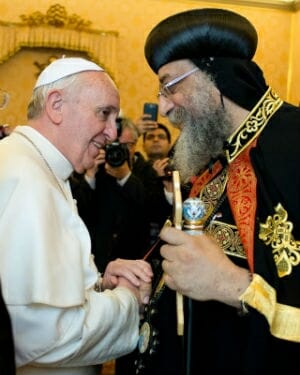
Jun 17, 2015 | Focolare Worldwide
 After the historic meeting between Francis and Tawadros II (Pope of the Coptic Orthodox Church and Patriarch of Alexandria), which place on May 10, 2013 at the Vatican, for the first time a day of celebration was held in Alexandria between the two Churches in commemoration of that meeting. Three months after the election of Francis, Tawadros II went to visit him on the day of the 40th anniversary of the historic visit of Pope Shenouda III to Paul VI. On that occasion, the Coptic Orthodox Patriarch had proposed that May 10th be celebrated each year as the Day of Friendship between the two Churches. The event was celebrated on June 7, 2015 at the Jesuit Cultural Centre in Alexandria, Egypt, under the patronage of the Coptic Catholic Patriarch, Ibrahim Ishak, in the presence of Tawadros II, who was joined by 8 Coptic Orthodox bishops and 5 priests. Also present, Papal Nuncio, Bruno Musarò, Latin Bishop, Adel Zaki, and around 100 Religious men and women, and Catholic priests. Promoters of the event included Sohphia University Institute (SUI); the current Director of the Cultural Centre and ex-student of SUI and friend from the Orthodox Church. Following a moment of prayer with readings and songs, a documentary film was presented that recalled the various stages of the historic meeting between the two Churches. In his message, Pope Francis reminded everyone that “what we have in common is much greater than what divides us” and that “we can persevere in our march towards full communion, and grow in love and understanding.The Coptic Patriarch immediately responded. That afternoon he telephoned Pope Francis, confirming his “will to continue in the common effort for the unity of Christians,” as Vatican spokesman Father Lombardi reported. In his speech, which was filled with affection for the Bishop of Rome, Tawadros II expressed his conviction that “today’s world is hungry and thirsty for concrete love. The unity between the Churches is in need of heroes of the faith,” and he indicated some necessary preconditions for reaching unity, such as openmindedness, and praying each day: “Give me an open mind, oh God, like the mind of Our Lord Jesus towards the Samaritan woman, and towards the Good Thief on His right.” But also a big heart, capable of going “beyond the letter.” And, finally, a humble soul that “safeguards the gifts and grace that God bestows.” His Holiness was moved as he described the touching humility of Pope Francis, when he met him and said to him again: “This day we have to celebrate every year!” Tawadros II personally greeted each of the guests. The joyful event ended by remembering the “ecumenism of blood” and the Egyptian and Ethiopian Martyrs in Lybia.
After the historic meeting between Francis and Tawadros II (Pope of the Coptic Orthodox Church and Patriarch of Alexandria), which place on May 10, 2013 at the Vatican, for the first time a day of celebration was held in Alexandria between the two Churches in commemoration of that meeting. Three months after the election of Francis, Tawadros II went to visit him on the day of the 40th anniversary of the historic visit of Pope Shenouda III to Paul VI. On that occasion, the Coptic Orthodox Patriarch had proposed that May 10th be celebrated each year as the Day of Friendship between the two Churches. The event was celebrated on June 7, 2015 at the Jesuit Cultural Centre in Alexandria, Egypt, under the patronage of the Coptic Catholic Patriarch, Ibrahim Ishak, in the presence of Tawadros II, who was joined by 8 Coptic Orthodox bishops and 5 priests. Also present, Papal Nuncio, Bruno Musarò, Latin Bishop, Adel Zaki, and around 100 Religious men and women, and Catholic priests. Promoters of the event included Sohphia University Institute (SUI); the current Director of the Cultural Centre and ex-student of SUI and friend from the Orthodox Church. Following a moment of prayer with readings and songs, a documentary film was presented that recalled the various stages of the historic meeting between the two Churches. In his message, Pope Francis reminded everyone that “what we have in common is much greater than what divides us” and that “we can persevere in our march towards full communion, and grow in love and understanding.The Coptic Patriarch immediately responded. That afternoon he telephoned Pope Francis, confirming his “will to continue in the common effort for the unity of Christians,” as Vatican spokesman Father Lombardi reported. In his speech, which was filled with affection for the Bishop of Rome, Tawadros II expressed his conviction that “today’s world is hungry and thirsty for concrete love. The unity between the Churches is in need of heroes of the faith,” and he indicated some necessary preconditions for reaching unity, such as openmindedness, and praying each day: “Give me an open mind, oh God, like the mind of Our Lord Jesus towards the Samaritan woman, and towards the Good Thief on His right.” But also a big heart, capable of going “beyond the letter.” And, finally, a humble soul that “safeguards the gifts and grace that God bestows.” His Holiness was moved as he described the touching humility of Pope Francis, when he met him and said to him again: “This day we have to celebrate every year!” Tawadros II personally greeted each of the guests. The joyful event ended by remembering the “ecumenism of blood” and the Egyptian and Ethiopian Martyrs in Lybia.
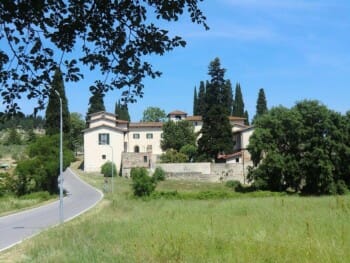
Jun 15, 2015 | Focolare Worldwide, Senza categoria
Live streaming of funeral 18 June (3.30 pm Italian time): http://live.focolare.org
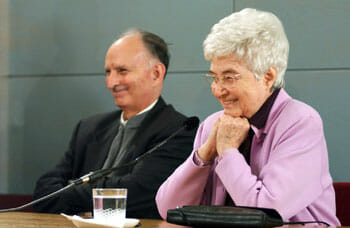
Pasquale Foresi with Chiara Lubich
 He was the first focolarino to be ordained to the priesthood, followed by others who also felt called to serve the Movement in this way. Pasquale saw in what was being done by Chiara Lubich and the first group of people around her “a spring of gospel life gushing forth in the Church” and he began an association with them that would lead him to make a fundamental contribution to the Movement’s development, as one of Chiara Lubich’s closest collaborators. Referring to his main tasks in the Movement, he wrote: “As a priest I was responsible for our first contacts with the Holy See. Another particular task, over the years, was following the Movement’s growth and development throughout the world and working with Chiara on writing the various Statutes. I also helped start up and follow some of the Movement’s centres and works, such as the ‘Mariapolis Centre’ at Rocca di Papa which runs courses for the members; the little town of witness at Loppiano in Italy; the Citta Nuova publishing house in Rome, and other works that developed in different parts of the world over time.” But there is one area of Fr Foresi’s life alongside Chiara that perhaps represents his specific contribution to the development of the Movement better than others. He explained: “It’s in the logic of things that every new spiritual current, every great charism, has an effect on culture at all levels. If you look at history you see that this has always been the case, influencing architecture, the arts, ecclesial and social structures, the various fields of human knowledge and especially theology.” In fact he spoke frequently and published numerous articles and books on the theology of Chiara’s charism and on its social and spiritual dimensions, authoritatively highlighting its newness in the context of both life and thought. His words contain “keen analysis, breadth of vision and optimism for the future made possible by the wisdom that derives from a strong and new charismatic experience, as well by the depths of light and love, humility and faithfulness that only God can achieve in a person’s life”. (Taken from the Preface to “Conversations” questions and answers on the spirituality of unity). The Focolare Movement throughout the world remembers him with immense gratitude. See also: Press release
He was the first focolarino to be ordained to the priesthood, followed by others who also felt called to serve the Movement in this way. Pasquale saw in what was being done by Chiara Lubich and the first group of people around her “a spring of gospel life gushing forth in the Church” and he began an association with them that would lead him to make a fundamental contribution to the Movement’s development, as one of Chiara Lubich’s closest collaborators. Referring to his main tasks in the Movement, he wrote: “As a priest I was responsible for our first contacts with the Holy See. Another particular task, over the years, was following the Movement’s growth and development throughout the world and working with Chiara on writing the various Statutes. I also helped start up and follow some of the Movement’s centres and works, such as the ‘Mariapolis Centre’ at Rocca di Papa which runs courses for the members; the little town of witness at Loppiano in Italy; the Citta Nuova publishing house in Rome, and other works that developed in different parts of the world over time.” But there is one area of Fr Foresi’s life alongside Chiara that perhaps represents his specific contribution to the development of the Movement better than others. He explained: “It’s in the logic of things that every new spiritual current, every great charism, has an effect on culture at all levels. If you look at history you see that this has always been the case, influencing architecture, the arts, ecclesial and social structures, the various fields of human knowledge and especially theology.” In fact he spoke frequently and published numerous articles and books on the theology of Chiara’s charism and on its social and spiritual dimensions, authoritatively highlighting its newness in the context of both life and thought. His words contain “keen analysis, breadth of vision and optimism for the future made possible by the wisdom that derives from a strong and new charismatic experience, as well by the depths of light and love, humility and faithfulness that only God can achieve in a person’s life”. (Taken from the Preface to “Conversations” questions and answers on the spirituality of unity). The Focolare Movement throughout the world remembers him with immense gratitude. See also: Press release

Jun 15, 2015 | Focolare Worldwide
 In 2011, three young people from a parish in the province of Córdoba (Argentina) were invited to a meeting in “Mariapolis Lia,” a small city of the Focolare Movement, 250 km from Buenos Aires. Participating at this meeting was a great experience for all three, a full immersion in the Gospel in action, an incentive to concretely give of themselves for others. “That meeting changed us,” says Susana. “We found that we were more enthusiastic, more welcoming, more trusting in God who we rediscovered is Love. It was a chance to grow as people but also as a group.” So much so that today there are about fifteen teens who are moving forward together with some very interesting initiatives. As an example, the “Clothing Fair,” a very useful idea for their region in which there are many families who live below the poverty line. In the parish, many items of clothing had been arriving which remained there, unused, because there was no one to bring them to those in need. So the teens took over: working hard, in a few Saturdays they had organized the location, which was a transformed basement; they had cleaned and perfumed it, thinking of those who would come to choose their clothes; they had displayed the merchandise, ironed and fixed up like new, and the result was the “Clothing fair.” At the beginning, they had thought not to ask for any compensation for the clothing, but then—thinking of the dignity of the buyers—they established prices that were accessible to everyone, without drawing attention to who was giving and who receiving, so that only love would circulate.
In 2011, three young people from a parish in the province of Córdoba (Argentina) were invited to a meeting in “Mariapolis Lia,” a small city of the Focolare Movement, 250 km from Buenos Aires. Participating at this meeting was a great experience for all three, a full immersion in the Gospel in action, an incentive to concretely give of themselves for others. “That meeting changed us,” says Susana. “We found that we were more enthusiastic, more welcoming, more trusting in God who we rediscovered is Love. It was a chance to grow as people but also as a group.” So much so that today there are about fifteen teens who are moving forward together with some very interesting initiatives. As an example, the “Clothing Fair,” a very useful idea for their region in which there are many families who live below the poverty line. In the parish, many items of clothing had been arriving which remained there, unused, because there was no one to bring them to those in need. So the teens took over: working hard, in a few Saturdays they had organized the location, which was a transformed basement; they had cleaned and perfumed it, thinking of those who would come to choose their clothes; they had displayed the merchandise, ironed and fixed up like new, and the result was the “Clothing fair.” At the beginning, they had thought not to ask for any compensation for the clothing, but then—thinking of the dignity of the buyers—they established prices that were accessible to everyone, without drawing attention to who was giving and who receiving, so that only love would circulate.  “One day,” recounts one of the teens, “a mother of eight children came. Seeing those affordable prices she chose a lot of clothes, and when she went to pay, with tears in her eyes she confided to us that it was the first time she was able to buy something for her children. Another time a woman came who seemed very interested: she walked around, looking at all the clothing but without buying anything. In the end she stopped to talk for a long time with us teens. We found out later that she came back other times, too, because as she herself confided, she knew that here she would always find someone who listened to her.” Leaving after her turn at the Fair, one of the girls noticed a man on the church steps who was crying. Knowing that Jesus is concealed within every person, especially the poor, she thought of something: “If he were Jesus, would I leave him alone to cry?” She decided to approach him, and the man sorrowfully described that for days he had lived on the street, he had nothing to eat and he suffered from serious health problems. The girl returned to the Fair to call the others from the current shift to search for a place for him to stay and for some food. Afterwards, they also found him a job.
“One day,” recounts one of the teens, “a mother of eight children came. Seeing those affordable prices she chose a lot of clothes, and when she went to pay, with tears in her eyes she confided to us that it was the first time she was able to buy something for her children. Another time a woman came who seemed very interested: she walked around, looking at all the clothing but without buying anything. In the end she stopped to talk for a long time with us teens. We found out later that she came back other times, too, because as she herself confided, she knew that here she would always find someone who listened to her.” Leaving after her turn at the Fair, one of the girls noticed a man on the church steps who was crying. Knowing that Jesus is concealed within every person, especially the poor, she thought of something: “If he were Jesus, would I leave him alone to cry?” She decided to approach him, and the man sorrowfully described that for days he had lived on the street, he had nothing to eat and he suffered from serious health problems. The girl returned to the Fair to call the others from the current shift to search for a place for him to stay and for some food. Afterwards, they also found him a job.  In many countries in Latin America, a girl’s 15th birthday is an important date. One young girl in the group was about to arrive at this date, but her family had no means to celebrate it, inviting friends and family. Hearing about this, the teens from the group wanted to help. First, they dedicated themselves to the decorations of the hall, according to the preferences of the girl’s mother. Then, they organized themselves to serve at table. But they, too, would have wanted to participate in the party and at the dance with elegant attire. What to do? Lined up in waiters’ uniforms, they welcomed guests at the door and served them at table, and then, for the dance, they ran to change, surprising everyone, especially the birthday girl. At the end of the party, they changed back into work clothes to put everything back in place, leaving the hall clean and in order. Talk about love!
In many countries in Latin America, a girl’s 15th birthday is an important date. One young girl in the group was about to arrive at this date, but her family had no means to celebrate it, inviting friends and family. Hearing about this, the teens from the group wanted to help. First, they dedicated themselves to the decorations of the hall, according to the preferences of the girl’s mother. Then, they organized themselves to serve at table. But they, too, would have wanted to participate in the party and at the dance with elegant attire. What to do? Lined up in waiters’ uniforms, they welcomed guests at the door and served them at table, and then, for the dance, they ran to change, surprising everyone, especially the birthday girl. At the end of the party, they changed back into work clothes to put everything back in place, leaving the hall clean and in order. Talk about love!
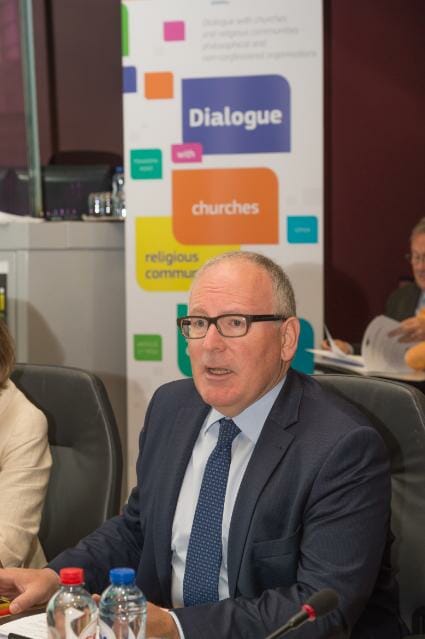
Jun 12, 2015 | Focolare Worldwide
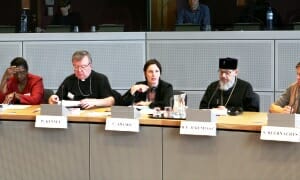 The meeting with the religious leaders will take place on 16 June at the Berlaymont Building in Brussels, seat of the European Commission. The top-level operational meeting is regularly held among the organisations of the European Union and churches, religions, philosophical associations and non-religious organizations, as provided by Art.17 of the Treaty of Lisbon. The results of the debate with the religious leaders will contribute to preparations for the European Union’s first Annual Convention on Fundamental Rights that will be held in Brussels on 1-2 October 2015 on the theme “Tolerance and respect: foresee and combat anti-Semitic and anti-Muslim phenomena in Europe.” The topic chosen for the debate, “Coexistence and acceptance of diversities,” underlines – in the words of Frans Timmermans, First Vice-President of the European Commission, that – “in our heterogeneous European societies, dialogue is essential in creating a community in which each feels at home. Living together means being able to accept the differences even in the presence of profound divergences.” Among the 15 religious leaders invited, are the Catholic Church’s representatives: Cardinal Reinhard Marx, Archbishop of Munich and President of the Episcopates’ Commission of the European Community (COMECE), and Maria Voce, President of the Focolare Movement.
The meeting with the religious leaders will take place on 16 June at the Berlaymont Building in Brussels, seat of the European Commission. The top-level operational meeting is regularly held among the organisations of the European Union and churches, religions, philosophical associations and non-religious organizations, as provided by Art.17 of the Treaty of Lisbon. The results of the debate with the religious leaders will contribute to preparations for the European Union’s first Annual Convention on Fundamental Rights that will be held in Brussels on 1-2 October 2015 on the theme “Tolerance and respect: foresee and combat anti-Semitic and anti-Muslim phenomena in Europe.” The topic chosen for the debate, “Coexistence and acceptance of diversities,” underlines – in the words of Frans Timmermans, First Vice-President of the European Commission, that – “in our heterogeneous European societies, dialogue is essential in creating a community in which each feels at home. Living together means being able to accept the differences even in the presence of profound divergences.” Among the 15 religious leaders invited, are the Catholic Church’s representatives: Cardinal Reinhard Marx, Archbishop of Munich and President of the Episcopates’ Commission of the European Community (COMECE), and Maria Voce, President of the Focolare Movement.

Frans Timmermans, First Vice-President of the European Commission
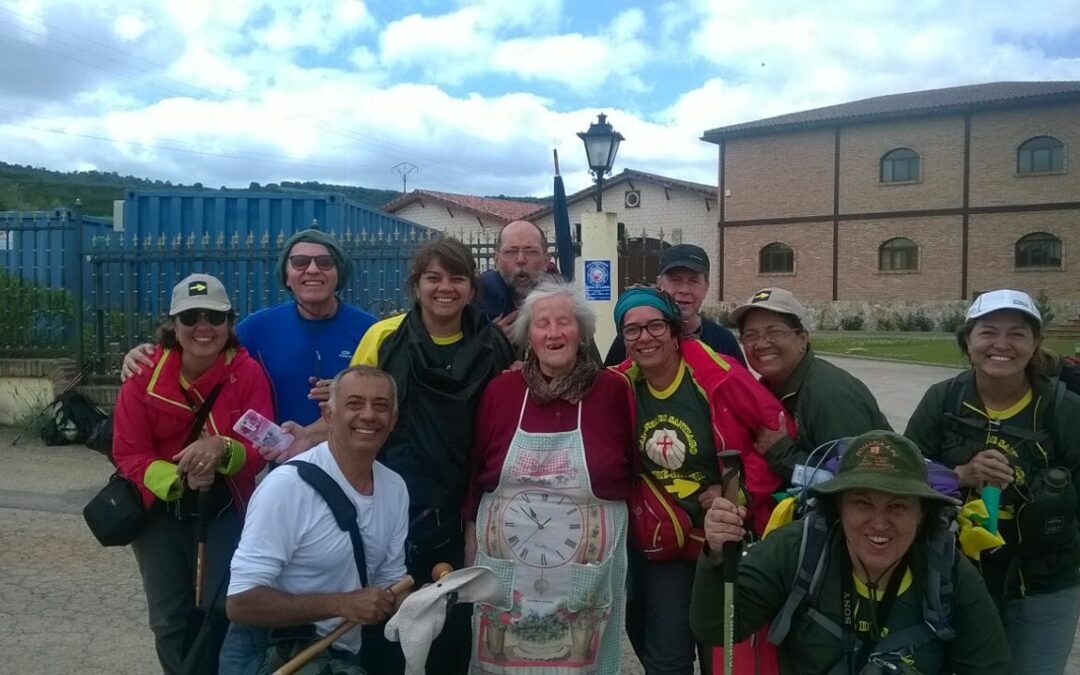
Jun 12, 2015 | Focolare Worldwide
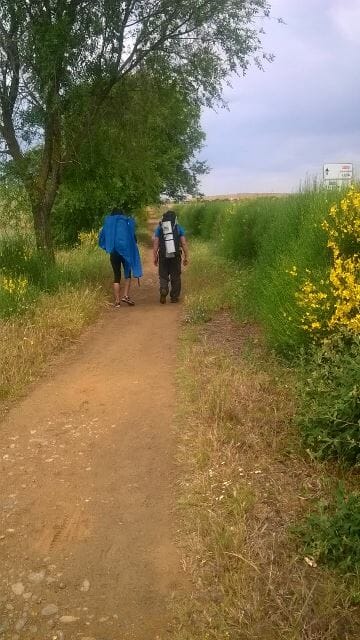 “The sun is beating down, but we need to get to the next village. Today we did another stretch with Grey from South Africa, a young television presenter. We were surprised to find people from all over the world, on the road to Campostela – from Korea, Japan, China, United States, Brazil, Canada and, naturally, Europe. Thirty years ago, only some 100 people would pass through Ronceveaux each year. The walk seems to respond to a need that is felt by the people of today. The reasons for taking the walk are many and it is interesting to share them. Peter, a 35 year old German hotel keeper from the vicinity of Monaco, sits at our table. He hasn’t gone on holiday for two years and, then, his girlfriend left him. He wants to think about life. Paul and Celine from Canada are doing the walk to give thanks for their life. Tracy from Australia is following a dream: she wants to have a great tale to tell her children and grandchildren. Antonella confided to us that she doesn’t know how to weep, she would like to get to know herself more and find her freedom. We took up El Camino 19 days ago: Bernard and Jean-Paul from Belgium and Ivo from Brazil who was frightened at the idea of having to walk 740 km. It seemed like too much. As the road stretches on you realise that the feet and legs are doing just fine, and with each new day your courage increases. Jean Paul, a married doctor, has been retired for a month. He makes frequent stops to explain the plants we find along the way. He helps us to take in the fragrances of the rich nature all around us. We are struck by the beauty of the flowers, the churches like in Burgos and in Lyon, but also in the small villages. We often turn around to enjoy the panorama behind us. Each morning we make a pact with one another to help us in the difficult moments. The walk brings us into touch with our limitations, sufferings, tiredness, thirst, hunger. . . and that can easily make us forget our neighbour.
“The sun is beating down, but we need to get to the next village. Today we did another stretch with Grey from South Africa, a young television presenter. We were surprised to find people from all over the world, on the road to Campostela – from Korea, Japan, China, United States, Brazil, Canada and, naturally, Europe. Thirty years ago, only some 100 people would pass through Ronceveaux each year. The walk seems to respond to a need that is felt by the people of today. The reasons for taking the walk are many and it is interesting to share them. Peter, a 35 year old German hotel keeper from the vicinity of Monaco, sits at our table. He hasn’t gone on holiday for two years and, then, his girlfriend left him. He wants to think about life. Paul and Celine from Canada are doing the walk to give thanks for their life. Tracy from Australia is following a dream: she wants to have a great tale to tell her children and grandchildren. Antonella confided to us that she doesn’t know how to weep, she would like to get to know herself more and find her freedom. We took up El Camino 19 days ago: Bernard and Jean-Paul from Belgium and Ivo from Brazil who was frightened at the idea of having to walk 740 km. It seemed like too much. As the road stretches on you realise that the feet and legs are doing just fine, and with each new day your courage increases. Jean Paul, a married doctor, has been retired for a month. He makes frequent stops to explain the plants we find along the way. He helps us to take in the fragrances of the rich nature all around us. We are struck by the beauty of the flowers, the churches like in Burgos and in Lyon, but also in the small villages. We often turn around to enjoy the panorama behind us. Each morning we make a pact with one another to help us in the difficult moments. The walk brings us into touch with our limitations, sufferings, tiredness, thirst, hunger. . . and that can easily make us forget our neighbour. 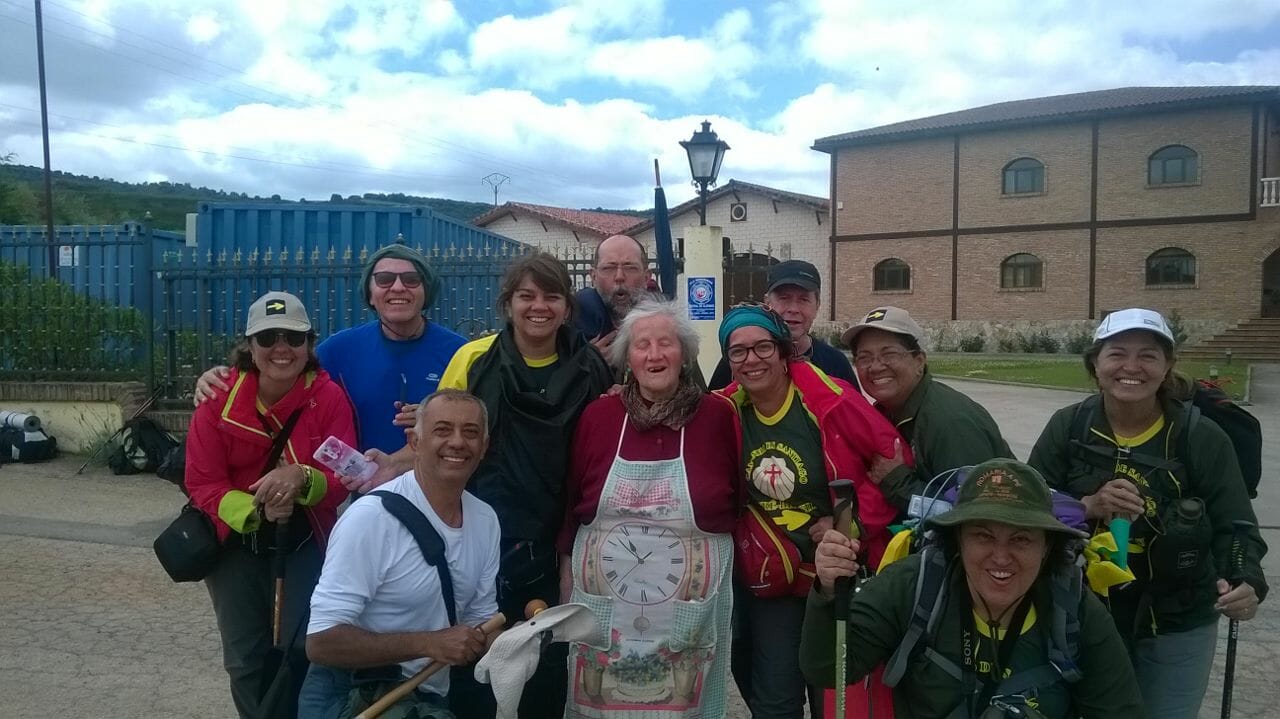 Ivo brings a lot of vitality to our little group, and others enjoy walking a few kilometres with us. They share their questions, difficulties and joys. One evening a priest told us the meaning of the word Compostela: Stars Field. We should also follow our star and be stars (light) for one another. Each day we come into touch with many hearts, but we are also touched by them. We try to open the door to God because we feel He is here amongst us through evanglical love. We have dinner with the others and pray altogether. Nicole is looking for people who would like to pray the Rosary. She recites it in Latin, Jean-Paul in French and we in Italian. Then Nicole begin to sing in Tagalo (Philippine language) and Ivo in Portuguese. Nicole recounts her story: she is on her way to entering a Religious community. Another time a policeman – Doriano – walks with us to 10 metres. He tells us he has prayed with us. This is a new experience in his life. Some cloistered nuns are also praying for us and for all the pilgrims; it is their vocation. Many wonder why we are speaking in Italian. We tell them our story, the story of Chiara Lubich and the Focolare Movement. To others we speak about the Gospel, the vocation and the journey of life. The experience of the Way of is different for every person. We are wondering what will happen when we reach the steps of St. James of Compostela. It will be a surprise like the one we will receive at the end of our lives. It will be joyful because of the journey, and having met so many people who have remained in our hearts. We wish them well with a ‘Buen camino’. Who knows when we’ll meet again?” Bernard, Jean-Paul, Ivo
Ivo brings a lot of vitality to our little group, and others enjoy walking a few kilometres with us. They share their questions, difficulties and joys. One evening a priest told us the meaning of the word Compostela: Stars Field. We should also follow our star and be stars (light) for one another. Each day we come into touch with many hearts, but we are also touched by them. We try to open the door to God because we feel He is here amongst us through evanglical love. We have dinner with the others and pray altogether. Nicole is looking for people who would like to pray the Rosary. She recites it in Latin, Jean-Paul in French and we in Italian. Then Nicole begin to sing in Tagalo (Philippine language) and Ivo in Portuguese. Nicole recounts her story: she is on her way to entering a Religious community. Another time a policeman – Doriano – walks with us to 10 metres. He tells us he has prayed with us. This is a new experience in his life. Some cloistered nuns are also praying for us and for all the pilgrims; it is their vocation. Many wonder why we are speaking in Italian. We tell them our story, the story of Chiara Lubich and the Focolare Movement. To others we speak about the Gospel, the vocation and the journey of life. The experience of the Way of is different for every person. We are wondering what will happen when we reach the steps of St. James of Compostela. It will be a surprise like the one we will receive at the end of our lives. It will be joyful because of the journey, and having met so many people who have remained in our hearts. We wish them well with a ‘Buen camino’. Who knows when we’ll meet again?” Bernard, Jean-Paul, Ivo
Jun 11, 2015 | Focolare Worldwide
The Summer School is an opportunity for international scholars and students from multiple disciplines to imagine the future – to recognize the possibilities hidden in the present and to understand the complex conditions required to navigate the possibilities. The Summer School will cultivate the skills and knowledge necessary to responsibly usher in a future of hope – a future charted with a moral compass directed by a commitment to the idea of the inherent value of the human person in the light of a culture that blossoms from the deep roots of relationships. The Summer School will encourage scholars to pursue research that informs paths to a positive future relying on epistemological questions derived by studies in economics, politics, law, theology and other technical and social science disciplines. For more information: Summer School 2015

 After the historic meeting between Francis and Tawadros II (Pope of the Coptic Orthodox Church and Patriarch of Alexandria), which place on May 10, 2013 at the Vatican, for the first time a day of celebration was held in Alexandria between the two Churches in commemoration of that meeting. Three months after the election of Francis, Tawadros II went to visit him on the day of the 40th anniversary of the historic visit of Pope Shenouda III to Paul VI. On that occasion, the Coptic Orthodox Patriarch had proposed that May 10th be celebrated each year as the Day of Friendship between the two Churches. The event was celebrated on June 7, 2015 at the Jesuit Cultural Centre in Alexandria, Egypt, under the patronage of the Coptic Catholic Patriarch, Ibrahim Ishak, in the presence of Tawadros II, who was joined by 8 Coptic Orthodox bishops and 5 priests. Also present, Papal Nuncio, Bruno Musarò, Latin Bishop, Adel Zaki, and around 100 Religious men and women, and Catholic priests. Promoters of the event included Sohphia University Institute (SUI); the current Director of the Cultural Centre and ex-student of SUI and friend from the Orthodox Church. Following a moment of prayer with readings and songs, a documentary film was presented that recalled the various stages of the historic meeting between the two Churches. In his message, Pope Francis reminded everyone that “what we have in common is much greater than what divides us” and that “we can persevere in our march towards full communion, and grow in love and understanding.The Coptic Patriarch immediately responded. That afternoon he telephoned Pope Francis, confirming his “will to continue in the common effort for the unity of Christians,” as Vatican spokesman Father Lombardi reported. In his speech, which was filled with affection for the Bishop of Rome, Tawadros II expressed his conviction that “today’s world is hungry and thirsty for concrete love. The unity between the Churches is in need of heroes of the faith,” and he indicated some necessary preconditions for reaching unity, such as openmindedness, and praying each day: “Give me an open mind, oh God, like the mind of Our Lord Jesus towards the Samaritan woman, and towards the Good Thief on His right.” But also a big heart, capable of going “beyond the letter.” And, finally, a humble soul that “safeguards the gifts and grace that God bestows.” His Holiness was moved as he described the touching humility of Pope Francis, when he met him and said to him again: “This day we have to celebrate every year!” Tawadros II personally greeted each of the guests. The joyful event ended by remembering the “ecumenism of blood” and the Egyptian and Ethiopian Martyrs in Lybia.
After the historic meeting between Francis and Tawadros II (Pope of the Coptic Orthodox Church and Patriarch of Alexandria), which place on May 10, 2013 at the Vatican, for the first time a day of celebration was held in Alexandria between the two Churches in commemoration of that meeting. Three months after the election of Francis, Tawadros II went to visit him on the day of the 40th anniversary of the historic visit of Pope Shenouda III to Paul VI. On that occasion, the Coptic Orthodox Patriarch had proposed that May 10th be celebrated each year as the Day of Friendship between the two Churches. The event was celebrated on June 7, 2015 at the Jesuit Cultural Centre in Alexandria, Egypt, under the patronage of the Coptic Catholic Patriarch, Ibrahim Ishak, in the presence of Tawadros II, who was joined by 8 Coptic Orthodox bishops and 5 priests. Also present, Papal Nuncio, Bruno Musarò, Latin Bishop, Adel Zaki, and around 100 Religious men and women, and Catholic priests. Promoters of the event included Sohphia University Institute (SUI); the current Director of the Cultural Centre and ex-student of SUI and friend from the Orthodox Church. Following a moment of prayer with readings and songs, a documentary film was presented that recalled the various stages of the historic meeting between the two Churches. In his message, Pope Francis reminded everyone that “what we have in common is much greater than what divides us” and that “we can persevere in our march towards full communion, and grow in love and understanding.The Coptic Patriarch immediately responded. That afternoon he telephoned Pope Francis, confirming his “will to continue in the common effort for the unity of Christians,” as Vatican spokesman Father Lombardi reported. In his speech, which was filled with affection for the Bishop of Rome, Tawadros II expressed his conviction that “today’s world is hungry and thirsty for concrete love. The unity between the Churches is in need of heroes of the faith,” and he indicated some necessary preconditions for reaching unity, such as openmindedness, and praying each day: “Give me an open mind, oh God, like the mind of Our Lord Jesus towards the Samaritan woman, and towards the Good Thief on His right.” But also a big heart, capable of going “beyond the letter.” And, finally, a humble soul that “safeguards the gifts and grace that God bestows.” His Holiness was moved as he described the touching humility of Pope Francis, when he met him and said to him again: “This day we have to celebrate every year!” Tawadros II personally greeted each of the guests. The joyful event ended by remembering the “ecumenism of blood” and the Egyptian and Ethiopian Martyrs in Lybia.






 The meeting with the religious leaders will take place on 16 June at the Berlaymont Building in Brussels, seat of the European Commission. The top-level operational meeting is regularly held among the organisations of the European Union and churches, religions, philosophical associations and non-religious organizations, as provided by Art.17 of the Treaty of Lisbon. The results of the debate with the religious leaders will contribute to preparations for the European Union’s first Annual Convention on Fundamental Rights that will be held in Brussels on 1-2 October 2015 on the theme “Tolerance and respect: foresee and combat anti-Semitic and anti-Muslim phenomena in Europe.” The topic chosen for the debate, “Coexistence and acceptance of diversities,” underlines – in the words of Frans Timmermans, First Vice-President of the European Commission, that – “in our heterogeneous European societies, dialogue is essential in creating a community in which each feels at home. Living together means being able to accept the differences even in the presence of profound divergences.” Among the 15 religious leaders invited, are the Catholic Church’s representatives: Cardinal Reinhard Marx, Archbishop of Munich and President of the Episcopates’ Commission of the European Community (COMECE), and
The meeting with the religious leaders will take place on 16 June at the Berlaymont Building in Brussels, seat of the European Commission. The top-level operational meeting is regularly held among the organisations of the European Union and churches, religions, philosophical associations and non-religious organizations, as provided by Art.17 of the Treaty of Lisbon. The results of the debate with the religious leaders will contribute to preparations for the European Union’s first Annual Convention on Fundamental Rights that will be held in Brussels on 1-2 October 2015 on the theme “Tolerance and respect: foresee and combat anti-Semitic and anti-Muslim phenomena in Europe.” The topic chosen for the debate, “Coexistence and acceptance of diversities,” underlines – in the words of Frans Timmermans, First Vice-President of the European Commission, that – “in our heterogeneous European societies, dialogue is essential in creating a community in which each feels at home. Living together means being able to accept the differences even in the presence of profound divergences.” Among the 15 religious leaders invited, are the Catholic Church’s representatives: Cardinal Reinhard Marx, Archbishop of Munich and President of the Episcopates’ Commission of the European Community (COMECE), and 

